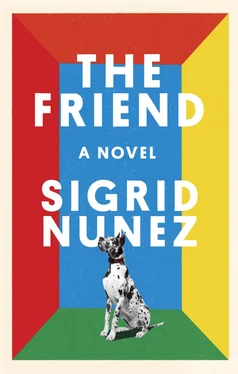• • •
Wife Three. I remember your telling us that she was a rock. ( My rock, you said.) Oldest of nine children, who as a girl had had large responsibilities thrust upon her when her mother developed a disabling illness and her father struggled to hold down two jobs. About her first marriage I knew only that her husband had died in a mountain-climbing accident and that they had a child: a son.
This is the first time she and I have ever been alone together. Because I have only ever known her to be reserved, I am surprised at how talkative she is today, the espresso loosening her tongue like wine. She does that thing with her head, shaking it back and forth as she speaks, slowly back and forth—is she trying to hypnotize me? She seems nervous, though her voice is soft and calm.
You were not the first person in her life to commit suicide, she says.
“My grandfather shot himself. I was just a little girl when it happened and I have no memory of him. But his death was very much a part of my childhood. My parents never talked about it, but it was always there, a cloud hanging over the house, the spider in the corner, the goblin under the bed. He was my paternal grandfather, and it had been drilled into me that I should never, ever ask my father about him. After I grew up I did finally get my mother to open up a bit. She said his suicide was a total shock. There was no note, and nobody who knew him could come up with a single reason for him to do such a thing. He’d never shown signs of being depressed, let alone suicidal. Somehow the mystery made it worse for my father, who for a long time kept insisting there must have been foul play. My mother said he seemed to be more angry with his father for not explaining himself than for taking his life. Apparently, he expected reason from a suicide.”
You, on the other hand, had always suffered from depression. And never worse, she says, than in those six months last year, when you could hardly get out of bed in the morning and didn’t write a word. What was strange, though, was that you’d gotten over that crisis and, since the summer, at least, had been in good spirits. For one thing, she says, the long drought was over and, after many false starts, you were finally launched on something that excited you. You were at your desk every morning, and most days you reported that the writing had gone well. You were reading a lot, the way you always did when you were working on a novel. And you were physically active again.
One of the things that made you so depressed last year, she explains, was that you’d hurt your back moving some boxes and couldn’t exercise for weeks. Even walking was painful. And you remember his mantra, she says: If I can’t walk, I can’t write. But that injury had finally healed, and you were back to your long walks and running in the park.
“He was back to socializing, too, catching up with all the people he’d been avoiding while he was depressed. And you know that he got a dog?”
You had, in fact, emailed me about the dog that you found early one morning when you were out running. Standing on an overhang, silhouetted against the sky: the biggest dog you’d ever seen. A harlequin Great Dane. No collar or tags, which made you think that, purebred though it was, it might have been abandoned. You did everything possible to find its owner and when that failed you decided to keep it. Your wife was appalled. She’s not a dog person to begin with, you said, and Dino is a lot of dog. Thirty-four inches from shoulder to paw. A hundred and eighty pounds. Attached was a photo: the two of you, cheek to jowl, the massive head at first glance looking like a pony’s.
Later you decided against the name Dino. He was too dignified for a name like that, you said. What did I think of Chance? Chauncy? Diego? Watson? Rolfe? Arlo? Alfie? Any of those names sounded fine to me. In the end you called him Apollo.
Wife Three asks if I knew a certain friend of yours who’d committed suicide just months before you did.
We never met, I say. Though you had told me about him.
“Well, that poor man was in terrible health. He had emphysema, cancer, angina, and diabetes—his quality of life was frankly rotten.”
You, on the other hand, had been in excellent health. The heart and muscle tone of a much younger man, according to your doctor.
A pause here, a near inaudible sigh as she turns her head to the window, eyes raking the street as if the answer she is looking for is surely going to appear; is just running a bit late.
“My point is, though he may have had his ups and downs and didn’t enjoy growing older any more than the rest of us do, he really did seem to be thriving.”
When I don’t say anything—what should I say?—she goes on: “I think it was a mistake for him to stop teaching. Not just because it was something he loved but because it gave his life a structure that I know was good for him. Though I also know he wasn’t as happy teaching as he used to be. In fact, he was always complaining. Teaching had become too demoralizing, he said, especially for a writer.”
My phone pings. The message is nothing urgent, but I note the time with a ripple of anxiety. It’s not that I have somewhere else I have to be, I’ve made no other plans for today. But it’s been half an hour, our cups are drained, and I still don’t know what I’m doing here. I keep waiting for her to bring up a particular subject, one that’s delicate to begin with and that I’d find even harder to discuss because I have no idea what she thinks or even how much she knows. I can think of several good reasons for you to have kept her in the dark about, for example, the group of students who complained about being addressed as “dear.”
I thought the students had handled things well. They sent their letter to you, and only to you.
You probably thought it was charming, they wrote. Demeaning was what it was. Inappropriate. You should stop.
Which you did, but not without sulking. A perfectly harmless habit, you’d been doing it for—how many years? Ever since you started teaching. And in all that time, not a single peep from anyone. And now everyone—every woman in the class (and, like most writing classes, this one was mostly women)—had signed the letter. Of course you felt ganged up on.
How petty, didn’t I agree? Didn’t I see how absurd and petty the whole business was? If only they’d get this worked up over their own word choices!
One of those rare times that we fought.
Me: Just because no one ever said anything didn’t mean no one objected.
You: Well, if they didn’t say anything, they didn’t object , did they?
Stupidly (I admit this was careless), I brought up the famous poet who’d taught in the same program many years before, and who, when selecting students competing for a place in his class, required the women to be interviewed in person, so that he could choose them on the basis of their looks. And got away with it.
I thought your head would explode. Talk about invidious comparisons! How dare I suggest that you’d ever done anything like that.
Sorry.
But what you had done, over the years, was conduct a series of romances with students and former students.
You never saw anything wrong with this. ( If I thought it was wrong, I wouldn’t do it. ) Besides, there was no rule against it. Which was as it should be, you said. The classroom was the most erotic place in the world. To deny this was puerile. Read George Steiner. Read Lessons of the Masters . I read George Steiner, who had been one of your own teachers, revered, beloved. I read Lessons of the Masters , and I quote: Eroticism, covert or declared, fantasized or enacted, is inwoven in teaching . . . This elemental fact has been trivialized by a fixation on sexual harassment.
Читать дальше












